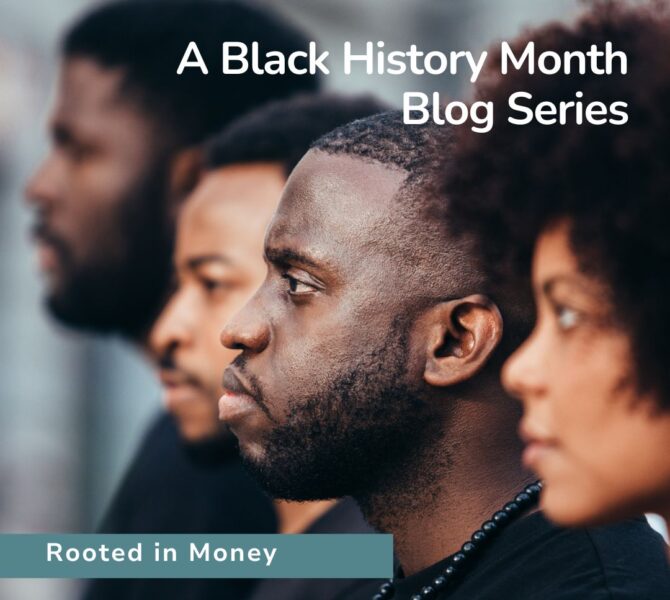Rooted In Money. A Blog Series.
It’s a social norm that talking about money is uncouth or vulgar.
This taboo originated from the British aristocracy; the landowning classes widely held a belief that wealthy people didn’t need to talk about their money. Their wealth was evident in their lifestyle – property, cars, clothes and social standing.
Or to use the vernacular of today, a ‘bling-bling’ lifestyle spoke for you and meant you didn’t have to sully the conversation with money.
Those who didn’t have money or wealth were conditioned not to discuss it.
That conditioning has been generational but has also been felt disproportionately.
To this day, we see the impact of not talking about money: chronically low levels of financial literacy; crippling stigma attached to debt and financial difficulties; ever increasing income and wealth gaps, and a financial system with structural inequalities baked in.
All are rooted in that conditioning.
A system built by the very wealthy – and here’s the sleight of hand – is sustained through our conditioning. It’s deemed greedy or vulgar to talk about money and wealth.
Skilful. Really skilful.
At Rooted Finance we talk about money.
We can’t affect change without breaking outdated (and self-serving) social norms.
Our day-to-day work supports people facing over-indebtedness and financial uncertainty. A significant part of that support is working with people to unlearn the shame associated with debt and money, and to normalise talking about their finances.
Encouraging them to take agency over their financial lives. Coaching them to ask difficult and awkward questions. Supporting them to equip themselves with knowledge. Uplifting them to challenge practices and making it “your business” to request explanations and justifications when it comes to their money and financial futures.
Making it normality.
It’s these community conversations that underpin the launch of this blog series.
“C.R.E.A.M. (Cash Rules Everything Around Me)” ~ Wu-Tang Clan
For Hip-hop aficionados, this iconic anthem was never about a bling-bling lifestyle or materialism (or just plain gangsterism as portrayed by the media).
It’s about the reality of poverty, and more importantly, how lack of money shapes the day-to-day struggle to make ends meet.
Globally, historically, Black communities have been at the sharp end of wealth inequality.
The UK is no different and data from the ONS’s Wealth and Assets Survey (2018) shows the median total wealth for a household headed by someone from a White British group was £314,000. This compares to £34,000 for a household headed by someone from the Black African group.
Nearly 10 times lower.
Launching Rooted in Money in Black History Month (BHM) is intentional.
This series is focused on the systemic barriers underpinning financial inequality for the Black community in the UK.
The theme this year is Standing Firm in Power and Pride, and we want to showcase the amazing organisations and individuals working to shift economic power to our communities through community-led and informed solutions.
Throughout this last week of BHM, we are delighted to host blogs from:
- Dr Nathania Atkinson, Academic, who explores the Leadership Gap in Financial services from the lens of Black women.
- Asher Craig, CEO, Pathway Fund, who examines the role traditional Social Finance plays in upholding inequalities that hold Black communities back.
- Ugo Ikokwu, Programme Lead for the Racial and Economic Justice Fund, Trust for London, explains why community-led approaches are central to how financial power is built.
- Tynah Matembe, Author and CEO of MoneyMatix, breaks down the ‘ethnicity premium’ and how we can learn to build financial wealth through education and a shift in mindsets.
- Erel Onojobi, Programme Director, Power 2 Prosper at Runnymede Trust, examines the historical roots of wealth inequality and how community-led approaches today are working to shift power back to communities.
- Dianne Greyson, Founder #EthnicityPayGap Campaign and Director Equilibrium Mediation Consulting, outlines why ethnic pay disparities are a central pillar of the wealth gap.
This series is just a glimpse of the wider efforts, conversations and mobilisation that’s happening across our communities. As a Black-led organisation, Rooted Finance sits at the intersection of racialised communities, financial services, the financial inclusion sector and race equity organisations.
It’s our responsibility to stand firm in power and pride.
As part of our Equity in Finance project, we’re working to dismantle discriminatory and biased practices, and remove structural barriers that compound intergenerational disadvantage, hinder wealth-building opportunities, and further erode trust in financial institutions.
We are delighted to be working with a wide range of financial institutions in this ground-breaking initiative and welcome those interested in making a meaningful difference for their minority ethnic customers to get in touch. You can contact us here
This piece is just the appetiser.
We are absolutely delighted to be sharing inspirational and thought-provoking blogs with you over this last week of Black History Month 2025.
I’d to thank our guest bloggers, Asher, Erel, Nathania, Dianne, Ugo and Tynah for their generosity and candid contributions.
I admire them as people and the work they are leading at the forefront of economic justice for Black and minoritised communities.
You are in for a treat.
Rooted in Money. cash rules everything around you too.
—–
Author Bio: Muna Yassin, Rooted Finance CEO, has over 20 years’ experience in financial inclusion services. Rooted Finance provides bespoke on-to-one support for London’s Diverse Ethnic Communities helping them manage financial distress, multiple debts, and work towards financial wellbeing and resilience. In March 2021 she was appointed to the VCSE Advisory Panel convened by VCSE Crown Representative, Claire Dove. The VCSE Advisory Panel has been set up to advise the government on how to help more organisations from the voluntary, community and social enterprise (VCSE) sectors compete effectively in public sector contracts. In June 2021, Muna was recognised in the Queen’s Birthday Honours List and was awarded an MBE for charitable Financial Services to Disadvantaged People during Covid-19.

